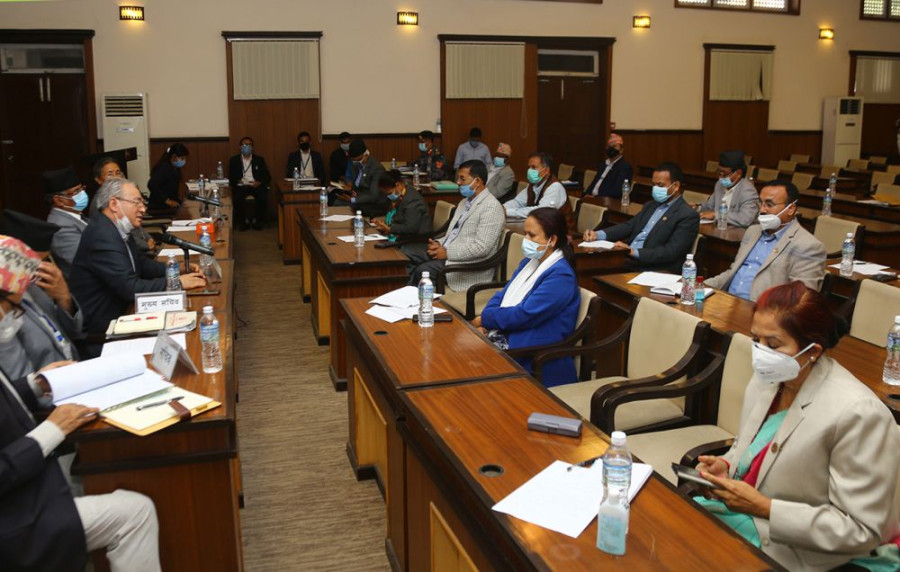National
Two years on, parties are still undecided on naturalised citizenship
State Affairs and Good Governance Committee has given five days to the parties to arrive at consensus or go for a vote.
Binod Ghimire
The provision of naturalised citizenship to a foreign woman married to a Nepali man continues to become a bone of contention among the parties to finalise the amendment bill on Citizenship Act, which has been under consideration in the federal parliament for around two years now.
The State Affairs and Good Governance Committee of Parliament has held over 140 meetings since the bill was first registered in August 2018. However, consensus remains elusive.
Shashi Shrestha, chairperson of the committee, had called a meeting for Wednesday to finalise the bill through voting if there was no unanimity among the parties.
However, the voting could not take place as the ruling and the opposition parties remain divided on the issue of naturalised citizenship.
Home Minister Ram Bahadur Thapa of the ruling Nepal Communist Party told the committee on Wednesday that the issue was a sensitive one that needed unanimous decision.
“This is a very serious matter that needs consensus among the parties. The government believes an agreement has to be reached through a dialogue at the political level,” Thapa told the committee.
At Thapa’s request, Shrestha has given five days to the ruling party to build a consensus on the disputed provision.
In Tuesday's meeting, the committee had proposed seven years to grant naturalised citizenship to a foreign woman married to a Nepali man.
The committee had also proposed issuing a national identity card to the woman after her marriage so that she is not deprived of social, economic and cultural rights until she obtains her Nepali citizenship.
The proposal was in line with the ruling party and seconded by the main opposition, Nepali Congress. However, the lawmakers said that they needed some time to discuss the matter with their respective party leadership.
The seven-year naturalisation period is similar to that of India.
Although Shrestha had postponed the meeting for Wednesday allowing a day for the primary opposition to arrive at the decision.
The Nepali Congress has said the seven-year naturalisation period is far too long and regressive.
“The party has decided for a continuation of existing provisions to grant naturalised citizenship,” said Dilendra Badu, a Nepali Congress lawmaker.
According to the existing provision, any woman married to a Nepali man is immediately eligible for naturalisation once she provides evidence of having initiated the process to renounce her foreign citizenship.
The amendment bill, however, includes a provision that if the woman cannot provide evidence of her citizenship of origin having been abandoned, her naturalised citizenship will be revoked.
Lawmakers from the Madhes are standing against the provision, demanding the continuation of the one in the existing Citizenship Act.
Naturalised citizens are eligible for all government positions, except the president, vice-president, prime minister, provincial governor and chief minister, as per the Constitution of Nepal.
With no progress in reaching an agreement, the parliamentary committee had formed a separate committee led by Nepal Communist Party leader Bijay Subba to forge a consensus but to no avail.
After several failed attempts to find a consensus on the issue, Shrestha had announced to finalise the bill through the voting.
The ruling party lawmakers are also of the view that the bill needs to be put to a vote, as there is no scope of finding a consensus.
“We have reached nowhere despite discussions in dozens of sittings. Voting is the only option now,” said Japat Rawal, a lawmaker from the ruling party.
Cross-party lawmakers have been demanding that the bill should be endorsed from the ongoing session of Parliament.
Rastriya Janata Party lawmaker Mahendra Raya Yadav last month had told the House of Representatives that hundreds of people had been affected because the Act was not amended.
The ongoing budget session of Parliament will last for at least another two more months.
The bill after the finalisation by the House of Representatives should be endorsed by both the Houses.




 17.12°C Kathmandu
17.12°C Kathmandu














